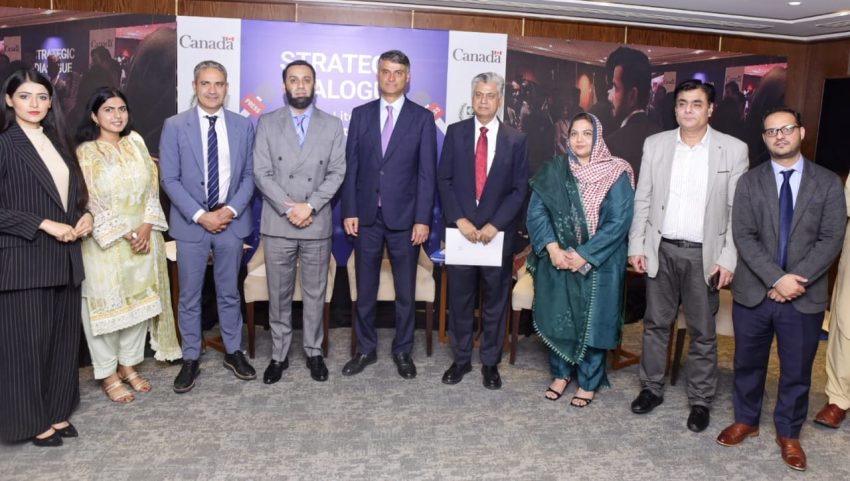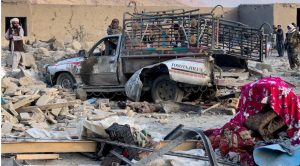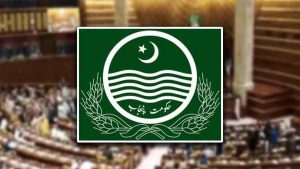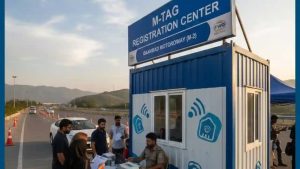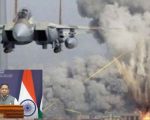LAHORE – The High Commission of Canada in Pakistan, in collaboration with the Department of Digital Media at the University of the Punjab, on Tuesday hosted a Strategic Dialogue on Media Literacy and Digital Resilience, bringing together senior government officials, media practitioners, academics, and civil society representatives to discuss media freedom and digital inclusion in Pakistan.
The event highlighted the outcomes of a capacity-building initiative funded under Canada’s Cyber and Digital Resilience Fund (CDRF), which aimed to counter misinformation, improve online safety, and promote media literacy as a civic skill in Pakistan’s rapidly evolving digital landscape.
The session, moderated by Ms Aniqa Nisar, featured Federal Minister for Information and Broadcasting Attaullah Tarar, Presidential Spokesperson Murtaza Solangi, UNESCO Country Representative Fuad Pashayev, Canadian High Commissioner H.E. Tarik Ali Khan, and Prof. Dr Savera Mujib Shami, Chairperson of the Department of Digital Media at the University of the Punjab.
Speaking at the event, Information Minister Attaullah Tarar said national security remains the government’s top priority and cited Pakistan’s handling of information warfare during regional conflicts as a sign of growing institutional maturity.
He warned that misinformation and disinformation have become “the most powerful modern weapons,” capable of distorting facts and spreading unrest.
Highlighting a key structural gap, he noted that Pakistan currently lacks local offices of major social media platforms, which limits accountability and direct engagement.
“Media and Information Literacy empowers citizens to think critically, assess information responsibly, and engage ethically in the digital space,” Mr Tarar said, adding that the government is working to bring these platforms to Pakistan to facilitate collaboration on digital safety and misinformation control.
The minister further recommended that media literacy be integrated into the national curriculum, calling it a necessary life skill for young citizens navigating the information age.
Presidential Spokesperson Murtaza Solangi described the modern era as a “digital deluge,” warning that the real battles of influence are now fought online rather than on borders.
“With just a single keyboard, anyone can create instability or manipulate narratives. The weaponisation of information is eroding trust and deepening social divides,” he cautioned.
Mr Solangi emphasised that misinformation poses one of the gravest global threats and urged for stronger safeguards to protect the integrity of public discourse.
UNESCO Country Representative Fuad Pashayev noted that this year’s Global Media and Information Literacy Week highlights the importance of questioning and verifying information in an era marked by the rise of generative AI and algorithmic influence.
“Media and Information Literacy remains our strongest defence in the age of AI. Understanding how technology shapes our perceptions is essential for resilient, informed societies,” he said.
Canadian High Commissioner H.E. Tarik Ali Khan reaffirmed Canada’s commitment to supporting media freedom and online safety worldwide.
“The cyber and digital ecosystem is an increasingly dangerous space. The world needs an informed citizenry that can participate meaningfully both online and offline,” he said.
“Canada is proud to support media freedom, digital inclusion, and the safety of those who work tirelessly to report the truth.”
Prof. Dr Savera Mujib Shami, Chairperson of the Department of Digital Media at the University of the Punjab, stated that media literacy should be viewed as a fundamental necessity in modern education.
“In a world shaped by algorithms and artificial intelligence, critical thinking and ethical media engagement are fundamental life skills,” she said, calling for the integration of Media and Information Literacy (MIL) into school curricula nationwide.
Building on the dialogue, the High Commission of Canada and the University of the Punjab announced a series of five capacity-building workshops to be held in Lahore, Islamabad, and Multan.
These sessions will train journalists and press club members in cybersecurity, digital safety protocols, and trauma-informed peer support systems, strengthening the professional resilience of Pakistan’s media community.
The initiative aims to promote a safer, inclusive, and ethically grounded media ecosystem, reinforcing the shared commitment of all partners to freedom of expression, informed citizenship, and democratic stability in the digital age.

